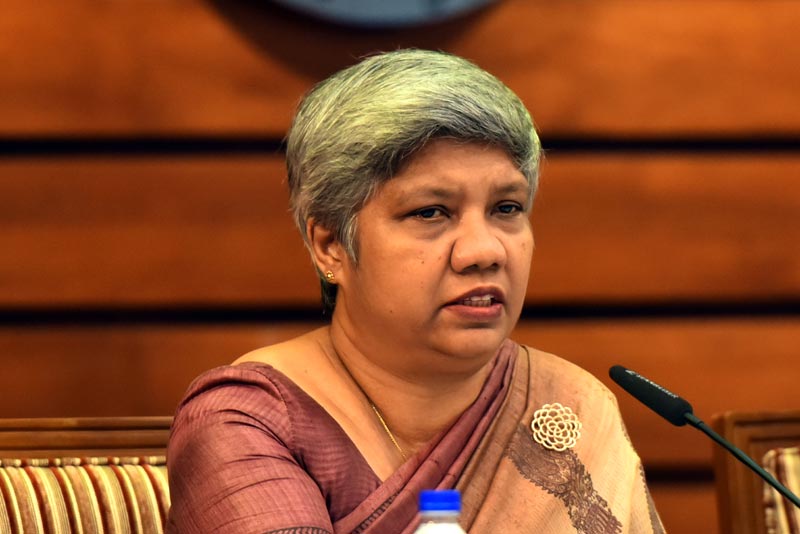Sunday Feb 22, 2026
Sunday Feb 22, 2026
Thursday, 28 March 2024 04:08 - - {{hitsCtrl.values.hits}}

Central Bank Senior Deputy Governor Yvette Fernando at the post-Monetary Policy review media briefing on Tuesday – Pic by Ruwan Walpola
By Nisthar Cassim
The Central Bank on Monday said plans are underway to step up revival of viable businesses by lending institutions.
Senior Deputy Governor Yvette Fernando said the CBSL’s Governing Board has approved a new framework for commercial banks to follow when it comes to business revival units and the financial services industry will be issued directions shortly.
The initiative of an expanded framework comes on the back of feedback that business revival units set up post-COVID pandemic hadn’t delivered the desired results.
As per the new framework, a Board-level policy is required for banks to make a more effective contribution to revive viable businesses/customers. The Board-level policy must lay out the criteria for classifying which customers need to be supported via Revival Units. Such Units must be headed by a Deputy General Manager with staff different/independent to the credit department with necessary skills.
The new framework will also lay guidelines with regard to helping customers who have exposure with multiple lending institutions. Assistance from the World Bank is being utilised to come up with new initiatives.
Fernando said that in the past year, only 2,263 parate actions were enforced by the financial services sector with non-performing loans worth Rs. 141 billion, which accounts for mere 1% of total lending and 8% of Stage 3 loans.
She also said that SMEs will benefit from several new initiatives such as the Secured Transactions Act and the proposed National Credit Guarantee Institution Ltd., (NCGI) which will provide partial credit guarantees on loans to SMEs. Funding for NCGI is from the Asian Development Bank with its recent commitment of US$ 100 million. NCGI will adopt procedures to effectively support SMEs including underwriting guarantees, risk management and risk-based pricing, and guarantee recovery operations. The project will incorporate green finance elements through climate adaptation and mitigation measures for SMEs.
On Tuesday the Central Bank announced a reduction in policy rates by 50 basis points underscoring the need for a swift and full pass-through of monetary easing measures to market interest rates, particularly lending rates, by the financial institutions, thereby accelerating the normalisation of market interest rates in the period ahead.
CBSL noted the pace of reduction of market interest rates, particularly lending rates, slowed in recent months, and yields on government securities, which recorded a notable downward adjustment in the first two months of the year, have shown some reversal.
Credit extended to the private sector by Licenced Commercial Banks (LCBs), which was in an expansionary phase since June 2023, witnessed a contraction of outstanding credit in January 2024, partly due to the valuation effects arising from the appreciation of the Sri Lanka rupee against the US dollar and possible post festive season settlements. However, credit growth resumed to some extent, as reflected by the preliminary data for February 2024.
“The prevailing accommodative monetary policy stance along with the reduction of policy interest rates effected are expected to induce a further reduction in market lending rates and encourage the expansion of credit to the private sector by LCBs in the period ahead,” CBSL said.
The Monetary Board was also of the view that a further easing of monetary policy would provide the required space for market interest rates, particularly lending rates, to adjust downwards further to levels conducive to continued expansion of credit to the private sector, thus supporting the ongoing revival of economic activity.
With regard to the Government’s decision to temporarily suspend the parate action until 15 December, the Central Bank Governor Dr. Nandalal Weerasinghe said its stand remains unchanged.
“In the interest of safeguarding public deposits and financial system stability, parate action must be allowed to deal with wilful defaulters.”
